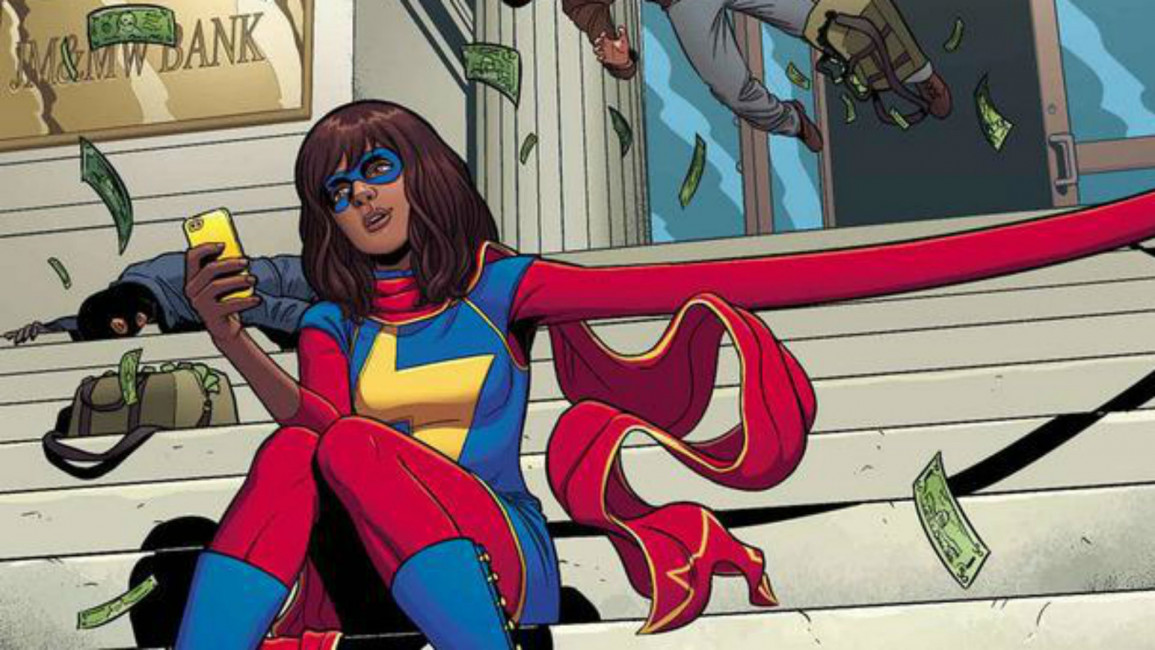Muslim representation in Ms Marvel: The good and not so good
The release of Ms Marvel has been met with much fanfare and excitement. And it’s not without good cause. For a very long time, Muslim representation didn’t exist within the global medium of American film and TV beyond a handful of stereotypes. So given the history within which it’s situated, there are elements of Ms Marvel that are undoubtedly a refreshing change of pace.
Kamala Khan aka Ms Marvel is a 16 -year-old Pakistani-American girl who, by all appearances, is meant to be ‘ordinary’. Except for the part where she becomes a superhero.
It sends the message that Pakistani girls from Jersey City, too, can be protagonists, main characters, heroes.
Representation is the word of the hour, and helping current and former Pakistani/Muslim diaspora teenagers feel seen is perhaps the show’s greatest contribution. But the cynic in me also realises that diverse representation isn’t just something sought by underrepresented minorities – it’s also a strategy that media brands such as Disney have actively adopted in recent years.
For anyone who has watched Pixar’s Turning Red, also on Disney+, the parallels to Ms Marvel are fairly obvious. Although Kamala is Pakistani and Meilin is Chinese, both teen girls feel torn between their love for their parents and their own need for self-actualisation.
''This is clearly an exciting time for Muslim on-screen representation. But since the bar was so low to begin with, let’s not let the writers and producers rest on their laurels just yet.''
Like Kamala, Turning Red’s Meilin also has well-meaning but overbearing parents. She also has interests her parents struggle to understand. She also wants to go to an event with her friends for which she knows she will struggle to get permission. And she also has a gift which she inherited from a maternal ancestor.
Theres’s a danger then that this portrayal of the diaspora teenager, torn between two worlds and struggling to find themselves, has become formulaic. What’s more troubling is that the portrayal of the parents still remains stereotypical – seemingly submerged in the culture of their homeland and oblivious to their children’s needs.
For instance, while being expected to have your dad accompany you to Avenger Con is entirely relatable, what Pakistani dad has ever felt the need to wear superhero themed shalwar kameez (not a thing) for any reason? Also, I have never heard of a Muslim parent calmly allowing their child to go to an event while also admitting that “there will be a lot of haram going on there”.
I grew up with parents who were, for all intents and purposes, more conservative than Kamala’s. Yet not only were my sisters and I allowed to go to the occasional concert, our dad would pay for the tickets too. While diaspora kids have had to sneak around, many diaspora parents have also silently permitted their children to do much more than film and TV writers seem to realise.
It’s possible that these discrepancies stem from the fact that the writer of the comics, G. Willow Wilson, is not Pakistani herself and didn’t grow up as a diaspora kid. The first page of the comic depicts Kamala staring with longing at a bacon sandwich – while I have known many, many Muslims in my lifetime, and Muslims who eat or want to taste pork do exist, I’d find it hard to believe that this is behaviour that most Muslims find relatable.
Upon reflection, what concerns me more is an apparent desire to over-compensate for the cultural influences their parents’ homelands have had on characters like Kamala and Meilin. There’s a need to portray them as ‘normal’ by saying, ‘look, they like going to parties and would eat bacon if they could’. These kids become more palatable to a western gaze than the ones – and there are many – who are conscious of their cultural norms, of halal and haram, even when their parents aren’t around.
More worrying still is the idea that a diaspora teenager must be gifted, exceptional, extraordinary in order to be seen. Ms Marvel is a great first step – but we can’t rely on representation alone to instil in our kids that their being is valid, and that they are enough, just as they are.
Overall, Kamala’s character is endearing and its portrayal by newcomer Iman Vellani hits all the right notes. The visual effects, combined with the soundtrack, create a show that is incredibly entertaining once the awkwardness of mish-mashed South Asian stereotypes passes. The star of the soundtrack, though, is what actually gave me goosebumps. It comes right at the end, by rapper Eva B who hails from Pakistan’s persecuted Baloch minority.
So there are a lot of things Ms Marvel gets right. This is clearly an exciting time for Muslim on-screen representation. But since the bar was so low to begin with, let’s not let the writers and producers rest on their laurels just yet.
And let’s also remember that while we as Muslims, diaspora kids, and immigrants deserve accurate, nuanced representation, and should keep demanding it, it’ll never be the solution to all our problems.
Afroze Fatima Zaidi is a writer, editor and journalist. She has a background in academia and writing for online platforms.
Follow her on Twitter: @afrozefz.
Have questions or comments? Email us at: editorial-english@alaraby.co.uk.
Opinions expressed in this article remain those of the author and do not necessarily represent those of The New Arab, its editorial board or staff.



